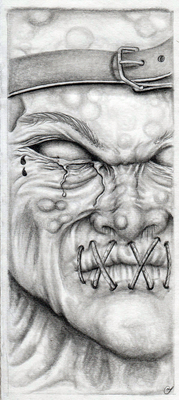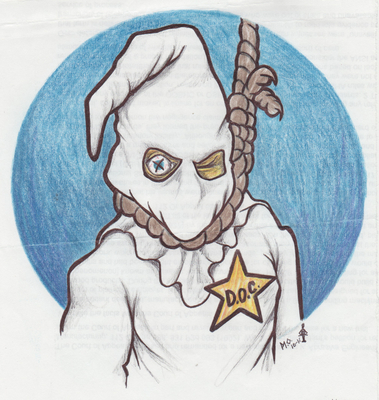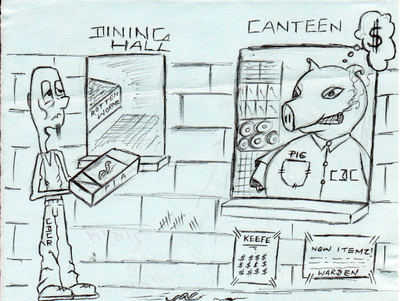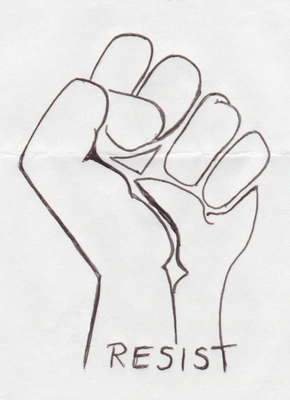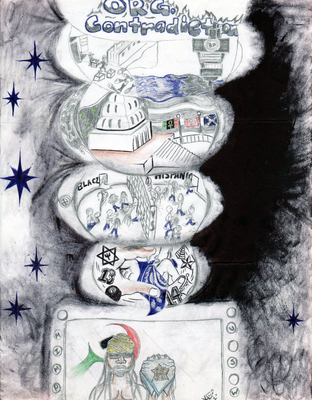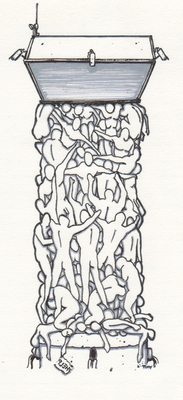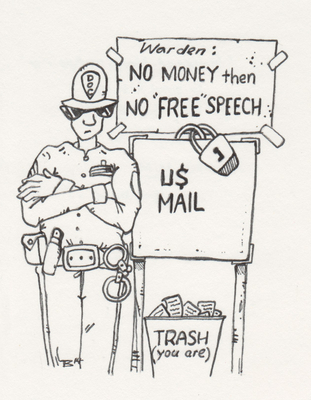
Pigs Endanger Safety and Security of Institution, Put Lives of Prisoners at Risk
“Everyone should know by now that prison is politics, it is part of the imperialistic policy of exploitation, oppression and domination over the internal colonies.” From “Who are the Political Prisoners?,” MIM Theory 11: Amerikkan Prisons On Trial
The pigs at Ironwood State Prison are at it again. Bored with the apparent lack of excitement and disturbances at this relatively peaceful and quiet yard, they have decided to manufacture their own entertainment to the detriment of the imprisoned. Within the span of two short days the pigs here have decided to raid people’s houses without any kind of factual proof but only unfounded allegations from “anonymous” sources and supposed “snitches.” To understand the actions of the past week however I must first recount the actions of a couple months ago.
It all began when pigs from Ironwood’s Special Investigative Unit raided the cell of a born-again Christian in the early hours before breakfast because they’d supposedly received an anonymous kite stating that the Christian was going to stab a Corrections Officer. The Christian was taken to the hole pending investigation and everyone here was left somewhat surprised at this news, as everyone who knew this guy knew that he’d long since left the lumpen lifestyle behind and was only concerned with helping people out. Anyways, after finally getting out of the hole because the investigation turned up nothing, he confided in a couple people that on the day he went to the hole the pigs showed him a picture of another prisoner and asked him if he knew who this persyn was. He lied and told them he didn’t, to which they responded, “that’s the person who told on you.”
Fast-forward to last week when two pigs unexpectedly ran to a cell and ordered the two cellmates to step out. When they asked the pigs what for, they were told not to worry about it and just step out. When the prisoners refused, the pigs immediately pulled out their batons and ordered them a third time to step out. Feeling threatened the prisoners complied. Once in restraints and out of their cell the prisoners were taken to the pigs’ local command post on the yard, A-Facility program office. Once there the prisoners were stripped naked and put into holding cages where they were accused of making wine and subsequently treated to verbal assaults. Both prisoners denied the allegations, which proved to be false as the pigs searched and tossed up their cell and found nothing.
As a result the pigs had no choice but to let them go, but not before showing them the pictures of a couple other prisoners. The pigs then asked them if they knew who those two people were, and they said they didn’t and were then cut loose. However, after returning to their building they started telling everyone what had happened and that the two prisoners who were in their building had snitched. Tension began to rise and it looked as if people were beginning to take sides preparing for the worst. In the end however, cooler heads prevailed and crisis was averted between the New Afrikan and Chican@ population, as these were the two nations being pitted against each other by the pigs’ actions. And even though I started out this story by saying that this is something of a peaceful yard, at the end of the day it’s still a prison and things happen.
The very next day almost the same scenario played out when ten or fifteen pigs rushed another person’s cell and forced him out the same way they done to those other prisoners the night before. Again, just as the previous night the pigs said they were looking for wine, and just like the night before they found nothing. As the pigs were exiting this person’s cell however they told him to thank the prisoners who’d gotten their cell searched the night before for their visit, thereby implying that those prisoners were somehow responsible.
These events from last week caused me to think deeper about the pigs’ actions, as well as the prisoners’ response to them and I’d like to discuss it here. Now, before jumping to conclusions because you took a pig at his/her word like most who are confronted with this scenario often do, why don’t we first stop and actually think about what’s really going on? The real issue in the examples given above aren’t about who supposedly snitched on who, but about the motivation that the pigs have in exposing their supposed informants to us. Let us hypothesize that in all the examples given above the pigs were actually telling the truth and the people identified by them in their pictures were really snitching, what then? Should we handle our business in keeping with prison etiquette or do we conduct our own investigation in an effort to get to the truth?
Instead of just smashing on the alleged rat because a pig told us to, why not at least confront this person with the information given to us by the pigs and ask him if it’s true before smutting him up? As a matter of fact, since when is a pig’s word even worth anything?
You can even go further than this and tell this person exactly what the pigs told you and if he denies it then we can offer to file some kind of paperwork together against that very same pig. Whether it be thru your local grievance procedure or thru the courts, put it on paper and put the pigs on blast. This way there will be documentation which shows how these pigs are putting the lives of prisoners at risk; either because you mistakenly assaulted another prisoner due to a pig manipulating you or because the person in question was really a snitch - it doesn’t matter!
Stop blindly taking the pigs at their word and doing their bidding, otherwise you’re just a sucker who’ll believe anything, as well as a tool of the establishment. We should strive to create unity out of the pigs’ attempts to divide us. Turn their divide-and-conquer tactics against them and UNITE! These actions on our part could potentially have a two-fold outcome beneficial to us. First, if the pigs see that we’re no longer biting into their little games they might stop baiting us, and secondly, if the rats know the pigs are giving them up and you’re gonna confront them then they might think twice about telling, thereby reducing any additional oppression of all prisoners concerned. This way bad things can be turned into good.
I know that many reading this are probably laughing and thinking it’s a joke, and yes to a certain degree what I’m proposing is somewhat ideal, but the harm we keep inflicting on each other is not. The possibility of creating a United Front becomes less viable without finding ways to settle contradictions amongst ourselves without resorting to violence, and we must begin somewhere.
As such, within the prison realm there are generally two different types of social contradictions: those between ourselves and the pigs and those among the prisoners themselves. The two are totally different in nature, and since they are different in nature the contradictions between ourselves and the pigs and those among the prisoners themselves should be resolved thru different methods. In order to resolve the very many contradictions that inevitably arise among ourselves we should look to the methods of discussion, of criticism, of persuasion and education, and not the methods of coercion or repression, i.e. violence. This way we can arrive at a new unity with these unstable prison elements on a new basis and against the real enemy.
Now, for those of you still reading this and still wondering if the people pointed out by the pigs were really snitches, that I don’t know. What I do know however is that one of the supposed “rats” is constantly pushing paperwork against the pigs on a variety of issues which concern the prisoner population. While one of the other prisoners involved recently go this life sentence commuted to a lesser term after serving almost twenty years; the pigs knew this and didn’t like it.
These pigs don’t care about us and it doesn’t matter to them what inmates are “snitches” and what inmates are “solid”. To them we’re all just prisoners and the same. Perhaps we should take that as a lesson and start looking at each other as one.
To all those people who are really snitching, start showing some self-respect and stop harming the people you should be working with to unite against the pigs. If you can’t stop telling them, at least tell on a pig and not another prisoner. For everyone else, stop being a pawn to these pigs and at least conduct your own investigation before erroneously labeling someone a snitch, smutting him up and getting him or yourself hurt. You never know, next time the pigs might flash your picture to someone and call YOU the snitch.





 Alabama
Alabama
 Alaska
Alaska
 Arizona
Arizona
 Arkansas
Arkansas
 Army Post
Army Post
 California
California
 Colorado
Colorado
 Connecticut
Connecticut
 Delaware
Delaware
 District of Columbia
District of Columbia
 Federal
Federal
 Florida
Florida
 Georgia
Georgia
 Guam
Guam
 Hawaii
Hawaii
 Idaho
Idaho
 Illinois
Illinois
 Indiana
Indiana
 Iowa
Iowa
 Kansas
Kansas
 Kentucky
Kentucky
 Louisiana
Louisiana
 Maine
Maine
 Maryland
Maryland
 Massachusetts
Massachusetts
 Michigan
Michigan
 Minnesota
Minnesota
 Mississippi
Mississippi
 Missouri
Missouri
 Montana
Montana
 Nebraska
Nebraska
 Nevada
Nevada
 New Hampshire
New Hampshire
 New Jersey
New Jersey
 New Mexico
New Mexico
 New York
New York
 North Carolina
North Carolina
 North Dakota
North Dakota
 Ohio
Ohio
 Oklahoma
Oklahoma
 Oregon
Oregon
 Pennsylvania
Pennsylvania
 Puerto Rico
Puerto Rico
 Rhode Island
Rhode Island
 South Carolina
South Carolina
 South Dakota
South Dakota
 Tennessee
Tennessee
 Texas
Texas
 Utah
Utah
 Vermont
Vermont
 Virginia
Virginia
 Washington
Washington
 West Virginia
West Virginia
 Wisconsin
Wisconsin
 Wyoming
Wyoming

